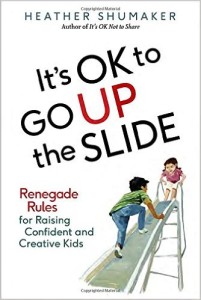By Drew Beeman
In her book, “It’s OK to Go Up the Slide: Renegade Rules for Raising Confident and Creative Kids”, Heather Shumaker goes so far up the slide that she “boldly goes where no one has gone before”. With boldness and conviction she bucks the trends that are so pervasive in our culture as it pertains to our children. Using modern research, psychology and good old fashioned common sense, she makes a great case for allowing children to experience the freedom and independence of previous generations. She calls for common sense in education reform, the use of modern technology by children, and allowing children to develop their social and emotional selves appropriately. She covers each subject with research, inspiring anecdotes, and wonderful advice about how to handle different situations that may come up as you transition your parenting style to follow her “renegade rules”.
In the first part of the book Shumaker discusses the issues of risk and independence. She bucks the trends of our risk averse society, and tactfully explains why this is so necessary. She explains that healthy risk taking not only teaches children “physical and social skills, it trains them to deal with unpredictability, allowing them to approach life with flexibility…risk helps kids become adults who are confident, resilient, and adventurous. Experiencing risk helps children gain skills in recognizing, assessing, and reducing risk… (but also) develops the frontal lobe of the brain…the area needed for executive functions, including concentration, memory, flexibility, and problem solving.” She quotes the research including how accident and injury rates are lower for children who experience risk. She further considers what happens when children are sheltered from healthy risk taking. She even explains the book’s namesake as she delves into why it is OK to go up the slide. That is one of my favorite parts, as I work with local child care centers, I find “no going up the slide” as one of the most prevalent rules on the playgrounds. A rule that I hope this book will help to change. In summery she says “Instead of limiting healthy risk of all types, we need to limit structured time and grant kids more independence. Train your children. Set smart limits. Let them practice. Let them go.”
In the next section Shumaker takes a common sense approach to limiting technology. She not only suggests limiting your children’s use of technology, but also your own. She makes the case for balanced time with family, distraction free, by restricting your own use of phones and social media, and offers great advice about how to do just that.
Shumaker tackles the issues that face our schools today, including a lack of recess, too much homework, and teaching standards that are not developmentally appropriate. When she talks about children having the need for more recess, she quotes the research, explains the developmental needs of children, and advocates for more time in recess. She quotes the Center for Disease Control and Prevention’s definition of recess as “regularly scheduled periods within the elementary school day for unstructured physical activity and play.” She encourages school districts to ban homework for elementary students, and encourages parents to “opt out”. She makes a much needed case for developmentally appropriate, play based kindergarten programs, and more appropriate pre-kindergarten “circle times”. This is something I see as a much needed change, as my work with child care centers has me often addressing “circle time” and its developmentally appropriate use.
Shumaker rounds out the book with several chapters about how to help children cope socially and emotionally with the world around them. She speaks to how we can help children navigate bullying in its many forms, deal with their feelings on unfair social issues, disasters, war, and stranger danger.
I highly recommend this book! I think that every parent and educator should read it and heed it! We need serious and immediate change in our society as we relate with our children. This book can help to guide us in the right direction. Heather Shumaker gets an A+ for this book!

